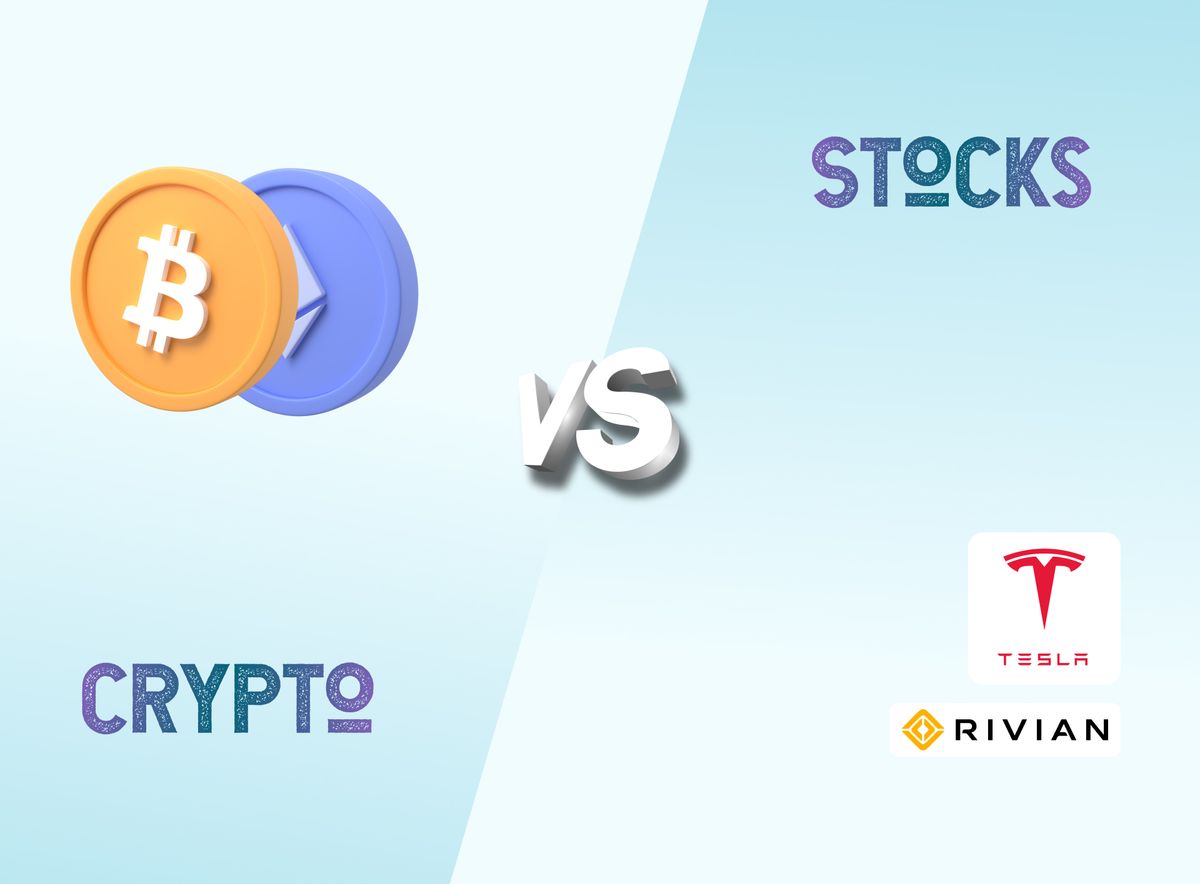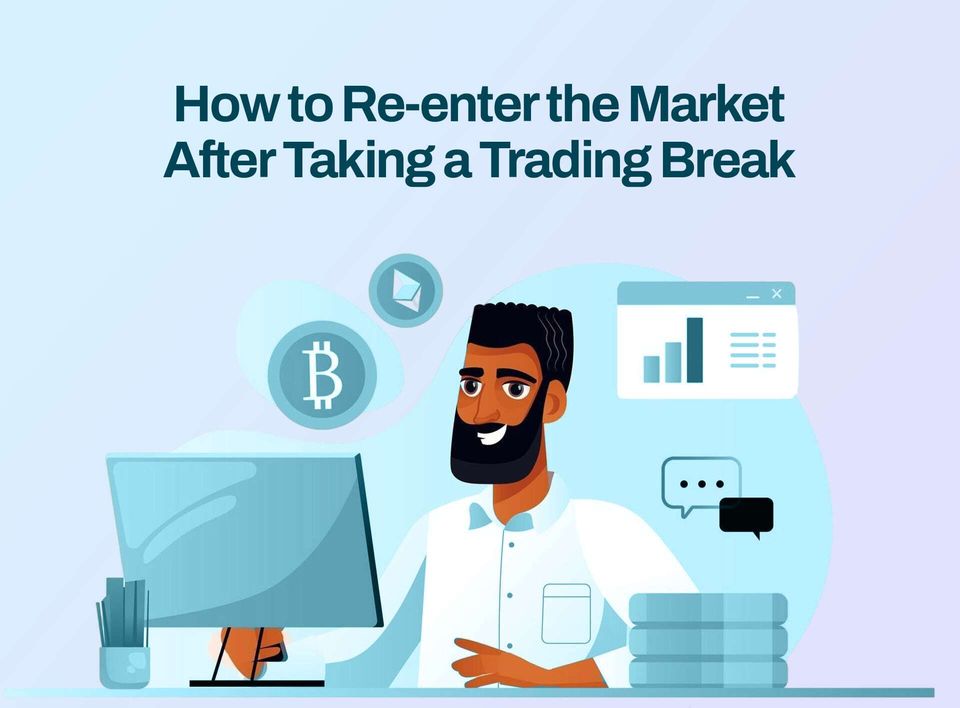Cryptocurrency vs. Stocks: What’s the Better Choice for You?
If you’re buying cryptocurrencies, it’s important to understand what you’re purchasing and how they compare to traditional investments such as stocks,.

Table of Contents:
- Introduction
- Should You Invest in Cryptocurrency or Stocks?
- Key Things Investors Need to Know About Stocks and Cryptocurrency
- Cryptocurrency and Stocks: What to Consider
- Bottom Line
- FAQs
Cryptocurrency has taken the world by storm, especially during the last few years.
According to Bloomberg, the total value of all these digital currencies has swelled to more than $2 trillion.
Of these, Bitcoin is the most popular, worth more than $1 trillion itself, according to CoinMarketCap.
Investors have swarmed into this digital gold rush, often with little knowledge and a lot of hope.
Cryptocurrency’s rapid appreciation has left many investors questioning the place of stocks in their portfolios.
However, there are numerous differences between stocks and cryptocurrencies.
The most important is that a stock is an ownership interest in a business (backed by the company’s assets and cash flow), whereas cryptocurrency, in most cases, is not backed by anything at all.
If you’re buying cryptocurrencies, it’s important to understand what you’re purchasing and how they compare to traditional investments such as stocks, which have a solid long-term track record.
Should You Invest in Cryptocurrency or Stocks?
Choosing between investing in cryptocurrency or stocks can be a tough decision, especially with both markets offering different risks and rewards.
Cryptocurrencies, like Bitcoin and Ethereum, have gained popularity for their high potential returns, but they also come with significant instability.
Stocks, on the other hand, tend to be more stable. Companies like Apple and Microsoft have shown steady growth over the years, making stocks generally less risky than cryptocurrencies.
However, stocks can still be unpredictable, influenced by company performance and market conditions.
Investing in cryptocurrency can offer high rewards but with high risks, suitable for those willing to tolerate significant price swings. Stocks, while generally safer, require a long-term perspective for substantial gains.
Your choice depends on your risk tolerance and investment goals.
If you're looking for potentially high returns and can handle market turbulence, cryptocurrency might be for you. If you prefer stability and long-term growth, stocks are likely the better choice.
In any case, research thoroughly and consider consulting a financial advisor to align your investments with your financial goals.
Key Things Investors Need to Know About Stocks and Cryptocurrency
Here are the key things investors need to know about stocks and cryptocurrency:
Stocks:
Stocks represent fractional ownership in a company, giving investors a claim on its assets and earnings. When you buy a stock, you're purchasing a small piece of that company. This ownership means that if the company grows and becomes more profitable, the value of your shares can increase. Stocks are traded on exchanges like the New York Stock Exchange (NYSE) and NASDAQ.
As a legal ownership stake in the business, stocks give shareholders a claim on the assets and cash flow of the business. These back your investment and provide a basis for its valuation.
One key aspect of investing in stocks is understanding dividends, which are periodic payments made to shareholders from a company’s profits. Not all companies pay dividends, but those that do can provide a steady income stream.
Why Stocks Rise and Fall:
Stock prices fluctuate based on investors' perceptions of a company's future success. These perceptions are influenced by various factors, including company performance, industry trends, economic conditions, and broader market sentiments. For instance, if a company reports strong earnings or launches a promising new product, its stock price is likely to rise.
On the other hand, if the company faces setbacks like declining sales or regulatory issues, its stock price may fall. Economic indicators such as interest rates, inflation, and employment figures also play a crucial role. For example, rising interest rates can make borrowing more expensive, potentially slowing down a company's growth and leading to a drop in its stock price. Market trends and investor behavior, driven by news, global events, and even social media, can also cause significant short-term price movements.
For a stock to be a successful investment, the underlying company must perform well over time. (Here’s a step-by-step guide for how to invest in stocks.)
Cryptocurrency:
Generally, cryptocurrency is not backed by any hard assets (specialised stablecoins being an exception), and that’s the case for the most popular crypto coins such as Bitcoin and Ethereum. Cryptocurrencies operate on blockchain technology, a decentralised digital ledger that records all transactions across a network of computers. As a digital asset, cryptocurrency can be used for various functions, such as sending money globally with low fees, using decentralised finance (DeFi) platforms that offer financial services without traditional intermediaries, or smart contracts that automatically execute after specific conditions are met.
Why Cryptocurrency Rises and Falls:
Cryptocurrency prices are highly unstable because they are largely driven by speculation and investor sentiment rather than tangible assets or cash flow. This means that the value of a cryptocurrency can change rapidly based on how people feel about its future potential. For example, when a well-known figure like Elon Musk tweets about a cryptocurrency, it can cause a sudden spike or drop in its value.
A key factor in cryptocurrency price movements is market demand. When more people want to buy a cryptocurrency, its price goes up. In contrast, if more people want to sell, the price drops. With cryptocurrencies, price swings can be much more extreme due to the speculative nature of the market.
In 2024, factors like regulatory news, technological advancements, and macroeconomic trends continue to play significant roles in the rise and fall of cryptocurrency prices. For instance, if a country announces a ban on cryptocurrency transactions, the market might react negatively, causing prices to fall. On the other hand, positive developments such as the introduction of a new, faster blockchain technology can boost investor confidence and drive prices up.
If you choose to invest in cryptocurrencies, it's crucial to stay informed about market trends and be prepared for rapid changes in value.
Check out this beginner’s guide to investing in cryptocurrency.
Cryptocurrency and Stocks: What to Consider

Risks and Safety:
If you’re thinking about investing in any market-based investment such as cryptocurrency and stocks, you need to carefully consider your risk tolerance. Can you handle the volatility in these kinds of assets? How well do you respond to gains and losses in your investments?
Stocks:
- Stocks are an ownership interest in a company, so a stock’s performance over the long term depends on the underlying company’s success.
- If investors don’t like a stock, they can sell it and push down the price, but, ultimately, the company has to go out of business for the stock to be worthless.
- Volatility is high with stocks, and many stocks can rise 100 percent or more in a year and may fall just as quickly.
- Generally, the stock market is an established way to invest with a strong track record.
- Investors who don’t want to buy individual stocks can own funds such as those based on the Standard & Poor’s 500, which has gained 10 percent per year on average over time.
Cryptocurrency:
- Cryptocurrency, unlike traditional stocks, lacks inherent backing by assets or cash flow, instead relying heavily on sentiment to influence its price movements.
- The absence of tangible backing means that if sentiment turns against a particular cryptocurrency, its value could potentially plummet to zero.
- Volatility remains a significant concern within the cryptocurrency market, with price swings of 50 percent or more within a year being relatively common occurrences.
- Regulatory actions pose a substantial risk to the cryptocurrency market, as proven by China's ban on cryptocurrency activities in 2021.
- Despite its growing popularity, cryptocurrency still lacks the long-standing history and established track record associated with traditional asset classes like stocks.
As risky as stocks can be, cryptocurrencies are even more speculative.
Time Horizon:
When it comes to choosing between cryptocurrency and stocks, your time horizon plays a crucial role in making a wise decision. Your time horizon simply refers to when you need the money from your investment. If your time horizon is short, meaning you'll need the money relatively soon, it's generally safer to opt for assets that are less volatile. This is because you want your investment to be there when you need it, without the risk of significant losses due to market fluctuations. Cryptocurrency, known for its high volatility, might not be the best choice if you have a short time horizon. Stocks, too, can experience significant ups and downs over short periods, so they're also considered riskier for short-term investments.
Financial experts often recommend that investors in riskier assets like stocks should have a time horizon of at least three years. This allows them to weather the storms of market volatility and potentially benefit from long-term growth.
Stocks:
- Stocks are often volatile, but they tend to be less volatile than crypto. Individual stocks are more volatile than a portfolio of stocks, which tends to benefit from diversification.
- Stocks are better suited to investors who can leave their money alone and don’t need to access it. Generally, the longer you can leave it invested, the better.
- Some stocks can be more volatile than others. For example, growth stocks tend to fluctuate much more than value stocks or dividend stocks.
- Investors may shift from more aggressive stocks (growth stocks) to safer ones (dividend stocks) as they need to tap their money, such as when they approach retirement.
Cryptocurrency:
- While stocks are volatile, cryptocurrency is ridiculously volatile. For example, during 2021, Bitcoin lost more than half its value in a few months and later gained 100 percent. Such volatility makes crypto unsuited for short-term investors.
- Crypto is better suited to traders who can leave their money tied up and wait for it to recover. Think years rather than weeks.
Portfolio Management:
When it comes to managing your investments, it's essential to consider both cryptocurrency and stocks as potential parts of your portfolio, alongside other assets like bonds or funds. Spreading your investments across different asset classes can help reduce risk and optimise returns over time. When deciding how to allocate your portfolio, consider factors such as your risk tolerance, investment goals, and time horizon. For instance, if you're looking for short-term gains and are comfortable with higher risk, you might allocate a smaller portion of your portfolio to cryptocurrency. However, if you're aiming for long-term stability and consistent returns, stocks may be a more suitable choice.
Cryptocurrency:
- Given its inherent risks, cryptocurrency works better with a small allocation in your overall portfolio. Think 5 percent or less.
- Even a small allocation could do wonders for your portfolio if cryptocurrency really takes off. Also, limiting to a small allocation protects you against a complete loss if crypto goes nowhere.
- If crypto grows to be a significant portion of your portfolio, you can reallocate more of your money to stocks to lower your portfolio’s overall risk.
Stocks:
- Given stocks’ strong long-term record, a diversified collection of stocks should make up the majority of your portfolio, especially if you have decades until you need to tap it.
- If you’re investing in individual stocks, you’ll need to research your stocks carefully to achieve good returns.
- If you’re investing in funds, you can buy a broadly diversified fund such as an S&P 500 index fund without significant research and enjoy the potential for high returns.
Bottom Line
Cryptocurrency has soared in price, but investors need to understand what they’re investing in, instead of just rushing in because other traders are. If you decide to take a stake in crypto, consider how it fits with your own risk tolerance and financial needs. Investors can earn good returns without investing in cryptocurrency, and some investors, including legends such as Warren Buffett, won’t touch cryptocurrency.
FAQs
Q1. What is cryptocurrency, and how is it different from stocks?
A1. Cryptocurrency is a digital form of money that uses cryptography for secure transactions. Stocks, on the other hand, represent ownership in a company.
Q2. Which one has higher returns, cryptocurrency, or stocks?
A2. Historically, stocks have provided higher average returns over the long term compared to cryptocurrencies.
Q3. Are cryptocurrencies riskier than stocks?
A3. Yes, cryptocurrencies are generally considered riskier due to their volatility and the lack of regulation compared to stocks.
Q4. Can I lose all my money investing in either cryptocurrency or stocks?
A4. Yes, there's a risk of losing all your investment in both cryptocurrency and stocks if the market goes down significantly.
Q5. Are cryptocurrencies and stocks affected by the same factors?
A5. No, cryptocurrencies are influenced by factors like market sentiment, technological developments, and regulatory news, while stocks are influenced by company performance, economic indicators, and market trends.
Q6. Which one is easier to invest in, cryptocurrency, or stocks?
A6. Investing in stocks is generally easier for beginners because there are more established platforms and resources available. Cryptocurrency investing may require more research and understanding of technology.
Q7. Do cryptocurrencies pay dividends like stocks?
A7. No, cryptocurrencies do not pay dividends like stocks. Instead, investors may earn returns through capital appreciation if the value of the cryptocurrency increases.
Q8. Which one is more widely accepted for everyday transactions, cryptocurrency, or stocks?
A8. Stocks are not used for everyday transactions; they are primarily bought and sold on stock exchanges. Cryptocurrencies have gained acceptance for certain transactions, but they are not as widely accepted as traditional currencies.
Q9. Can I invest in both cryptocurrency and stocks?
A9. Yes, you can invest in both cryptocurrency and stocks to diversify your investment portfolio and spread out risk.
Q10. What should I consider before investing in either cryptocurrency or stocks?
A10. Before investing, consider your risk tolerance, investment goals, time horizon, and level of understanding of the assets. It's also important to do thorough research and consider seeking advice from financial professionals.
Disclaimer: This article was written to provide guidance and understanding. It is not an exhaustive article and should not be taken as financial advice. Obiex will not be held liable for your investment decisions.




